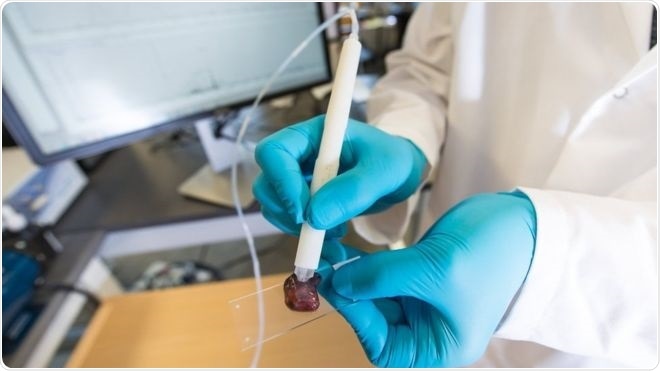Researchers from the University of Texas at Austin have invented a pen-like, handheld device that can identify cancerous tissue in around 10 seconds during surgery, offering hope that procedures to remove cancer could be made quicker, more precise and safer.

Credit: Vivian Abagiu/Univ. of Texas at Austin
The MasSpec Pen detects cancer more than 150 times faster than the current technology. It guides surgeons by telling them which tissue to cut or preserve, thereby improving the surgery and reducing the chance of recurrence.
The team hopes that if the new device is approved for clinical use, it would avoid the “heartbreak” of leaving any cancer behind: "If you talk to cancer patients after surgery, one of the first things many will say is 'I hope the surgeon got all the cancer out.’ It's just heart-breaking when that's not the case. But our technology could vastly improve the odds that surgeons really do remove every last trace of cancer during surgery," says Livia Schiavinato Eberlin, who led the research.
The current method for distinguishing between healthy and cancerous tissue is called Frozen Section Analysis, a slow method that can take more than 30 minutes to prepare and interpret. For some forms of cancer, it is also inaccurate, giving unreliable results in up to 20% of cases.
The new device takes advantage of the difference in metabolism between normal cells and cancerous ones. Each cancer generates a unique set of metabolites (the products of metabolism) and other substances that serves as a molecular fingerprint of the tissue.
When the MasSpec pen is held against a suspected cancer, it releases a tiny drop of water, which the metabolites and other biomarkers migrate to. The water droplet is then sucked up by the pen and analysed by a mass spectrometer connected to the device. This instrument can measure thousands of chemicals every second. A fingerprint is then produced that tells the surgeon whether the tissue is cancerous.
As reported in Science Translational Medicine, the MasSpec pen was used to test 253 tissue samples removed from patients with cancer. The device took around 10 seconds to diagnose cancer and was more than 96% accurate in doing so. It also detected cancer in marginal regions between healthy and cancerous tissue that had a mixed composition of cells.
Eberlin says what is exciting about the technology is that it clearly meets a clinical need. The team plan to start testing the device during surgeries carried out in 2018 and have filed US applications for the technology. They are also trying to secure patents across the globe.